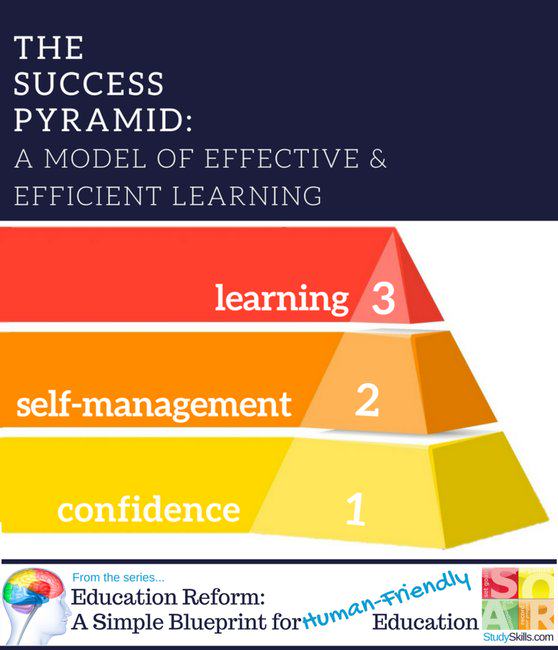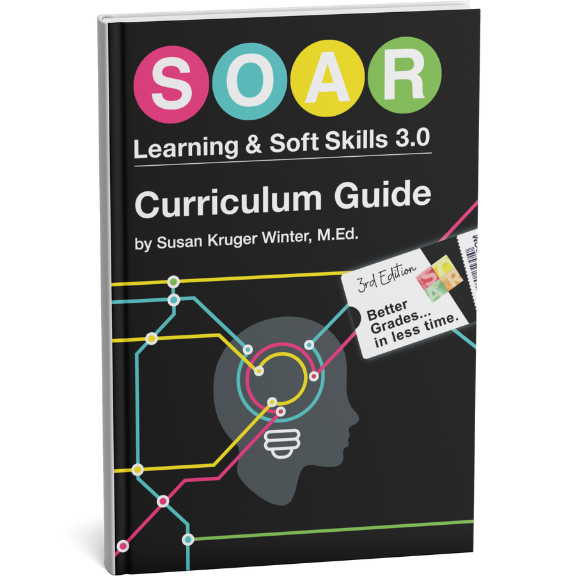The Success Pyramid:
A Model of Efficient & Effective Learning
This article is from our series, Education Reform: A Simple Blueprint for Human-Friendly Education. For a directory of all articles in this series, click here. To get the full series in one downloadable PDF, sign-up for the free report in the black box on the right.

The Success Pyramid identifies three essential elements required for successful learning in school and throughout life:
Level 1: Confidence
The core foundation of learning requires “confidence.” Every teacher knows, when students do not believe in their own abilities, they make no progress.
Confidence is not optional; it’s critical! Priscilla Vail, author of Smart Kids with School Problems said it best, “Emotions are the ‘on/off’ switch to learning.”
Henry Ford arguably agreed when he famously said, “Whether you think you can or you think you can’t—you’re right!”
“Confidence” includes students’ belief in themselves and their comfort in their environment.
Level 2: Self-Management
Self-management includes the knowledge and ability to: manage interactions with others, communicate effectively, and be organized. These skills are often called “executive function” skills (particularly in special education) or “soft skills” (in the workplace).
The ability to communicate effectively, manage behavior, and organize is critical for success. Organization skills are necessary for managing: tasks, time, papers, supplies, steps in a process, and information for recall.
Studies by Stanford Research Institute and the Carnegie Mellon Foundation among Fortune 500 CEOs found that 75% of long-term job success depended on soft skills and only 25% on technical skills.1
You can learn all the information in the world, but if you can’t organize, manage, and access it when needed, it won’t do you any good. If you can’t work effectively with others, you won’t get very far in the workplace.
Self-management skills are essential for success in school, in the workplace, and even for managing a home and family.
Level 3: Learning
The process of “learning” is usually thought to be difficult, arduous, hard work… This perception is only because our schools have grossly over-complicated every aspect of learning. Learning is nothing more than a process of making connections between new information and “known” information.
In other words, everything you have ever learned in your life, you’ve learned by attaching the new information to something you already understood.
The very nature of learning hinges on a person’s ability to categorize and connect new information, which is why the ability to organize is prioritized before the ability to learn.
Conclusion
The Success Pyramid outlines the three layers required for successful learning:
Level 1: Confidence. Students must believe in their abilities and be comfortable in their environment.
Level 2: Self-Management. Students must know how to effectively manage interactions with others, communicate effectively, and be organized.
Level 3: Learning. Only after students are feeling confident and have developed some self-management skills (especially organization) are they able to learn successfully.
In the next article, we’ll look at how this model is directly correlated with the biology of the brain.
To our students’ success,
Susan Kruger, M.Ed.
Education Reform: A Simple Blueprint for Human-Friendly Education
This article is from our full report on education reform. Portions of the report will be released on a weekly basis in article form (see the directory below).
However, to access the full report (in its entirety) now, sign-up in the black box on the right.
Education Reform Article Directory:
- Introduction to Education Reform: A Simple Blueprint for Human-Friendly Education
- Three Core Problems with Education in the United States
- The Success Pyramid: A Model of Effective & Efficient Learning
- The Brain Biology of Learning: Why the Success Pyramid Works
- Solutions for Core Problem #1 with Education in the United States
Solutions for Core Problem #2 with Education in the United States
Solutions for Core Problem #3 with Education in the United States - Special Education: It Doesn't Have to Be So Difficult - Part I of III
Special Education: How to Solve & Prevent Learning Disabilities - Part II of III
Special Education: The Brain Biology of ADHD & Autism - Part III of III - Ideal Instructional Models: Successful Examples of Complete Human Education
- Finland: A Political Model of Education Reform
- Why Common Core Is the Worst & BEST Thing to Happen to Education
- The Simplest Leverage Points in Reading, Math, & Skills Instruction
- Looking Forward: Advice from a Futurist
- Conclusion: The Four Principles of Optimal Instruction
- Summary: An Ideal School System
SPECIAL REPORT: To get the full series in one downloadable PDF, sign-up for the free report in the black box on this page.

Sources
1 Abbas, Kadir, & Azmie. “Integrating Soft Skills Assessment Through Soft Skills Workshop Program for Engineering Students at University of Pahang: An Analysis.” International Journal of Research In Social Sciences, Vol. 2, No.1 (2013): p. 1.
Six Steps
Conquer the Chaos
Get Our Free Guide & Information on...
 How to Organize & Motivate Students for Success
How to Organize & Motivate Students for Success
"*" indicates required fields
Get Our FREE Curriculum Guide!
The SOAR® Curriculum
The most critical learning, organizing, and communication skills needed for school. Learn more here.
Who’s Using SOAR®?
SOAR® Guarantee
Click here to learn more.





